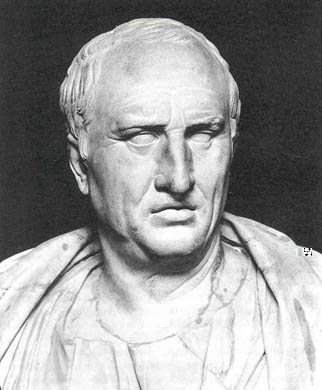Downes vs Wiley – Cato and Cicero revisited
 The official launch of the Cape Town Declaration getting a good bit of attention. I’m not going to critique the declaration specifically, but rather come at it from the perspective of the debate between two main protagonists, namely Stephen Downes and David Wiley. I hope neither takes offence as I like and admire both of them, but I think there is a means of understanding the issues around the declaration by exploring their differences over this. And I’m going to do this by revisiting a previous analogy, namely that of Roman senators Cato and Cicero.
The official launch of the Cape Town Declaration getting a good bit of attention. I’m not going to critique the declaration specifically, but rather come at it from the perspective of the debate between two main protagonists, namely Stephen Downes and David Wiley. I hope neither takes offence as I like and admire both of them, but I think there is a means of understanding the issues around the declaration by exploring their differences over this. And I’m going to do this by revisiting a previous analogy, namely that of Roman senators Cato and Cicero.
For the purposes of this post, Cato = Stephen and Cicero = Wiley. Cato and Cicero both believed passionately in the same higher level goal, ie the establishment of the Roman Republic. Yet they frequently clashed about what was the best way to achieve it. In the same way I think Stephen and David both believe passionately in the overall aim of open education, but have differing views as to how it should be realised.
 Cato was the purist, unbending and uncompromising. Cicero was the pragmatist, willing to compromise and work with a range of people to advance the republic. Cato often thought Cicero compromised too much, thus rendering his beliefs invalid. Cicero was often infuriated that Cato wouldn’t compromise and through this played in to the hands of the anti-republicans. Taking our modern day counterparts, it seems to me that most of Stephen’s objection comes down to the inclusion of commercial entities in the CTD, e.g. from this post
Cato was the purist, unbending and uncompromising. Cicero was the pragmatist, willing to compromise and work with a range of people to advance the republic. Cato often thought Cicero compromised too much, thus rendering his beliefs invalid. Cicero was often infuriated that Cato wouldn’t compromise and through this played in to the hands of the anti-republicans. Taking our modern day counterparts, it seems to me that most of Stephen’s objection comes down to the inclusion of commercial entities in the CTD, e.g. from this post
"And goodness, the internet is already awash with really vile and intrusive commercial activity, do we have to export it too? We have the opportunity to do something really special in the world; why do we have to carve into every declaration of principle a paean to Things As They Are (and Those Who Profit From Them)?"
It is not just the presence of commercial entities in the declaration that is at stake here, but the question of whether any educational services can be charged for. David Wiley makes the distinction between nonrivalrous goods (content basically) and rivalrous ones (support). For open education to be sustainable he sees that monetising the latter is probably essential:
If you believe that rivalrous services are a critical part of learning and of education, then you have two choices: (1) either welcome those who are willing to create sustainable ways of providing these services into our community, or (2) continue to try to drive the evil companies away, simultaneously guaranteeing that a critical part of the support infrastructure never comes into being.
His option 1) is pure Cicero, and 2) pure Cicero criticism of Cato. Now, a lot of learning can be done informally, peer supported, community based, as seen for example when we analyse the type of learning that takes place in open source communities. But Wiley argues that this can’t be all of it, and if you want teachers, experts, or maybe even accreditation and tech support, then in a capitalist world someone there need to be models of sustaining this.
So, if we take our Cato and Cicero model, let’s look at the options:
-
You don’t believe in the republic anyway
-
You’d like to believe in it, but don’t think it will ever happen (there will always be a Caesar who comes along)
-
You believe in it and are willing to work within the existing structures to achieve it
-
You believe in it but think the existing structures need a revolutionary change
Most publishers and related companies sit at 1) A lot of institutions reside at 2). Wiley is at 3) and Downes at 4).
Me? I’m actually interested in the business models that arise from a disaggregated education system, I don’t have any problem working with commercial entities and I compromise at the drop of a hat, so I’m a 3) kinda guy, although I always have an admiration for those who stick to their principles around 4).

3 Comments
Greg
Most instituions have faculty making these choices or IT staff making these choices. At my instition the IT people make the decisions and faculty follow (like cats). We can’t trust the IT folks to implement products from vendors well. How could we ever trust them with open source support/decision making/programming?
ictlogist
3.5 for me
great post 🙂
5tein
Fun, apt analogy, though it would be fun to hear/compile arguments from folks on 1 & 2 as well.
Unfortunately, folks in group 1 often discredit themselves almost as their raison d’etre, making any arguments they do make immediately subject to scrutiny.
And, as Greg says, that “We can’t trust the IT folks to implement products from vendors well.” which makes any chance of hearing a well-formed argument from folks in group 2 less likely (at least the folks in group 1 have PR who can articulate their position in logical [if often unsound] language).
Me? I’m probably 2.75, but then again I’d like to think I’m open to ANY solutions that will serve the different “populations” that are considered.